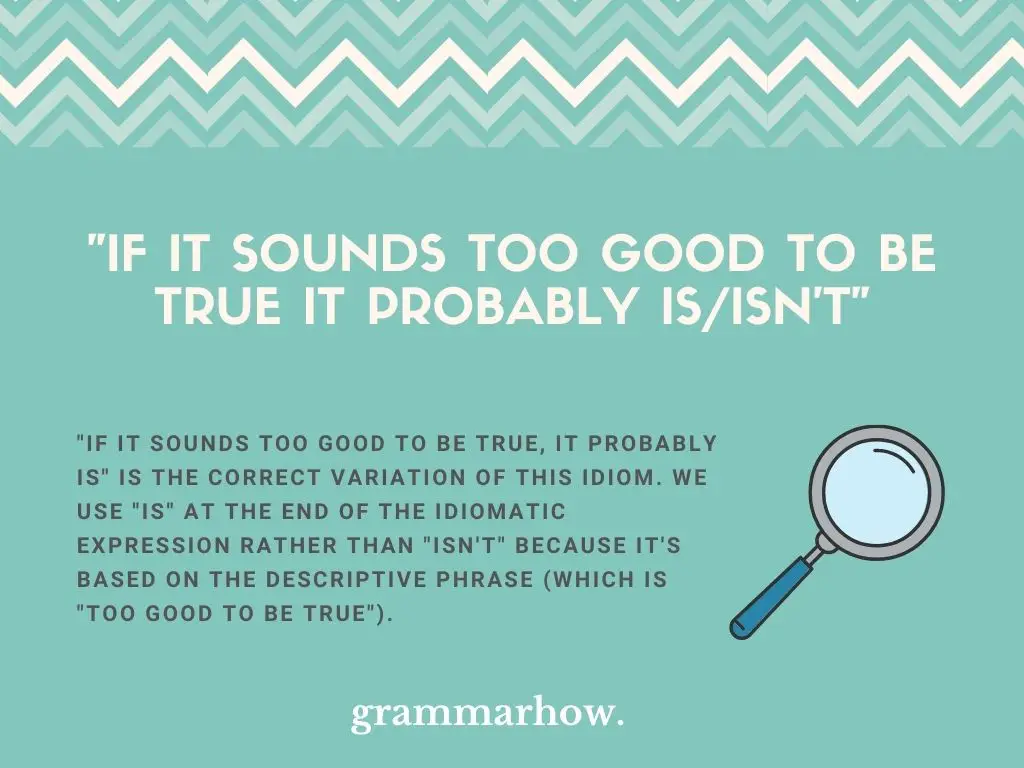Well, it’s no secret that some things might sound too good to be true. It might help to know what that idiom means and where it came from. This article will explain all you need to know about it before using it again next time!
Is It “If It Sounds Too Good To Be True, It Probably Is” Or “If It Sounds Too Good To Be True, It Probably Isn’t”?
“If it sounds too good to be true, it probably is” is the correct variation of this idiom. We use “is” at the end of the idiomatic expression rather than “isn’t” because it’s based on the descriptive phrase (which is “too good to be true”).

If you don’t know what we mean, it will help if we expand the idiom:
- If it sounds too good to be true, it probably is (too good to be true).
We’ve included the correct extension in parentheses to show you why we say “it probably is.”
The descriptive phrase we use after “is” is always “too good to be true.” We do not simply use “true.” People who get it wrong will think that it makes more sense to say the following:
- Incorrect: If it sounds too good to be true, it probably is not (true).
However, “true” is not the description we’re using in this idiom. “Is not” simply doesn’t work, and you should avoid using it if you want to remain correct.
What Does “If It Sounds Too Good To Be True, It Probably Is” Mean?
It might help to go over a bit more about the meaning. That way, you will have a better understanding of how to make it work.
“If it sounds too good to be true, it probably is” means that something is probably acting much better than it is. It might look good on paper, which might be enough to attract you to do whatever it is, but you’ll soon realize that it’s a lot more disappointing than that.
A good example would be to refer to a date with someone you’re really interested in.
Let’s imagine that you had a date, and the person you met had all the same interests as you. You clicked in every way, and you can’t wait until you can see them again.
They currently seem far too good on paper because there’s no way for somebody to be that similar to you, right? Well, you might find later down the line that they lied about most of their interests, which is where the “it probably is” portion comes from. It’s used to share doubt.
Sometimes, we can be quick to rush to a positive judgment before we’ve weighed up all the options.
Here are some examples:
- If she sounds too good to be true, she probably is, Steven.
- If it sounds too good to be true, it probably is. I wouldn’t chase after a fairytale.
- If it looks too good to be true, it most certainly is. Don’t be silly, and do your research.
- If we feel too good to be true, we probably are. Careful what you say to us.
- If they seem too good to be true, they probably are. I don’t want you making any silly mistakes.
What Is The Origin Of “If It Sounds Too Good To Be True, It Probably Is”?
The first portion of the idiom can be dated back to the sixteenth century (though it’s likely that it’s even older than that). Mark Twain’s “Huckleberry Finn” from 1884 contains the most well-known usage of the phrase.
Other than the main part of the idiom, the rest of it comes from coming English sayings. There is no way to identify where it came from historically.
There’s no way to guarantee exactly who came up with the combination of words in this way, but we know that has always been a cautionary idiom uttered by people who want you to be careful.
“If It Sounds Too Good To Be True, It Probably Is” – Synonyms
Finally, it might help to know of a few good alternatives to the idiom. Some of these might be more appealing to you:
- Don’t judge a book by its cover
- By no stretch of the imagination
- Don’t be too quick to judge

Martin holds a Master’s degree in Finance and International Business. He has six years of experience in professional communication with clients, executives, and colleagues. Furthermore, he has teaching experience from Aarhus University. Martin has been featured as an expert in communication and teaching on Forbes and Shopify. Read more about Martin here.

